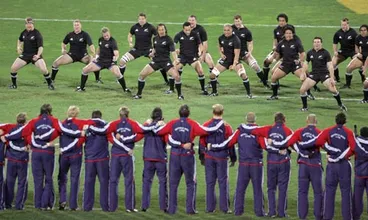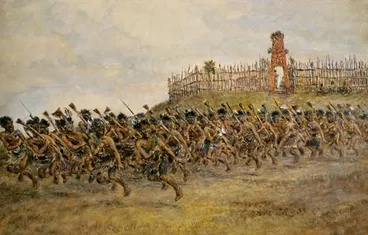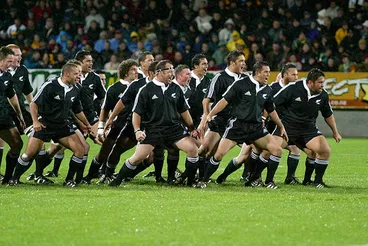HIST-243 Visual essay
A DigitalNZ Story by Ryan Close
A DigitalNZ story by Ryan Close
Kiwi Culture is expressed in many different ways, through this essay I will explore how Kiwi culture is exemplified in adventure and expedition, sport and the Haka. These expressions of the Kiwi culture confirm many aspects of the traditional depictions of Kiwi culture. Coming from such a beautiful, epic and truly dangerous terrain the Kiwi culture has always had a hand in adventure. A Kiwi Icon, Edmund Hillary exemplifies the Kiwi culture in adventure, expedition and humbleness, he was the first person to climb Everest and make it back down to tell the tale; he also completed many conquests into the Antarctic. He also was an incredibly philanthropist and gave so much life to the Himalayan people.
Humbleness is one of the things that I take away from Sir Edmund Hillary, when he reflects upon his life he does not talk about all of his great accomplishments, he speaks of the love and happiness that he was able to absorb and spread, "If my life finished tomorrow I would have little cause for complaint, I have gathered few successes and a handful of honours and more love and laughter than I probably deserve. In a sense my life is strung together by a series of friendships."[Nothing Venture, Nothing win, CH19, p 308] He exemplifies the Kiwi culture, this is a nation with great people who refuse to impose their accomplishments upon one another, but instead engage in the act of love.
Edmund is looking off into the unknown, seeking what no other man has done, with a grin.
Sir Edmund Hillary (1919–2008)
National Library of New Zealand
Looking like a man at war Edmund is navigating through one of the most extreme environments that exists on Earth.
[Sir Edmund Hillary[?] Nepal - Mt Everest]
Auckland War Memorial Museum Tāmaki Paenga Hira
Feet away from death, this picture shows the perils of climbing Everest, death is never too far away out there.
[Sir Edmund Hillary - Everest Expedition. Copies of ?Times? photos]
Auckland War Memorial Museum Tāmaki Paenga Hira
Going out into the unknown was how New Zealand was discovered by Abel Tasman in 1642, Kiwi culture has appreciated the adventure into the unknown and Sir Edmund Hillary exemplifies that further by continuing to expedition into the Antarctic after climbing Everest.
One of the worlds greatest adventures lived a life filled with expedition into some of the most extreme places.
Edmund Hillary on Plateau
Antarctica New Zealand
The casual nature of this campsite on the top of the Everest ice fall shows just how brave Hillary and his team were.
[Camp 111 at the top of the icefall, Nepal. Sir Edmund Hillary at left, John Hunt, centre, in braces]
Auckland War Memorial Museum Tāmaki Paenga Hira
Sir Edmund Hillary and Sherpa Tenzing Norgay literally on the top of the world.
[Sir Edmund Hillary - Everest Expedition. Copies of ?Times? photos]
Auckland War Memorial Museum Tāmaki Paenga Hira
Each year of his life Sir Edmund Hillary would return to the Himalayas and put in work on his school and hospital. He sees this as one of his true passions. I see this as exemplifying Kiwi culture, the notion of giving back, and this expresses what New Zealand is. In light of the recent shooting, I have witnessed the largest out pouring of love that I have ever seen, caring for others is a central aspect of Kiwi culture.
In his life Sir Edmund Hillary loved to give back, this picture exemplifies that, he is giving water to a local woman.
[Sir Edmund Hillary, Lady June Hillary hiking rest stop, Nepal]
Auckland War Memorial Museum Tāmaki Paenga Hira
Since colonization New Zealand has had an appreciation for the sport of Rugby. Throughout New Zealand's history they have dominated at rugby on the world stage. Rugby has been used as a device to facilitate colonization, yet also as a stand against racism and oppression. Rugby is much a part of New Zealand as the mountains, rivers and beaches are. Rugby in many ways confirms the classic depictions of New Zealand, even at the first discovery with Abel Tasman, he commented on the size and violent nature of the locals. Rugby is a violent sport with teams of strong intimidating people, this is incredibly similar to the message that was spread around the world of what New Zealand was like when it was originally discovered. Rugby is an expression of the Kiwi culture, it has shaped this country in many fundamental aspects.
The All Blacks have unified New Zealand since the early days, this national pride has never evaporated.
All Black rugby team
Alexander Turnbull Library
Rugby's violent nature makes it thrilling to watch and support, it also exemplifies the traditional depiction of Kiwi.
[rugby match - All Blacks]
Museum of New Zealand Te Papa Tongarewa
New Zealand stands united in their support for the All Blacks.
All Black haka
Manatū Taonga, the Ministry for Culture and Heritage
The Haka is an integral part of Kiwi culture, it was originally used as a display of war and the indigenous tribes each has their own individual Haka. Originally through to be a barbaric display, it is actually a well though-out meaningful song and dance. It is central to Maori culture which is Kiwi culture. The Haka epitomizes the traditional depictions of New Zealand and confirms the depictions of Kiwi culture.
A depiction of a traditional war Haka as the tribe looks to be attempting to intimidate the settlement.
Haka
Manatū Taonga, the Ministry for Culture and Heritage
Currently the Haka exemplifies more than just Maori culture, it celebrates the unity of this country. The All Blacks, the pride of New Zealand always performs a Haka before they play. Many school children are taught the Haka in school growing up. The Haka is a fundamental aspect of Kiwi culture and exemplifies their past and future. The Haka is not limited to just the Maori, it is done by all. From New Zealand's traditional roots the continual usage of the Haka confirms the traditional depiction of Kiwi culture and it shows how much this country has progressed. It harkens back to how New Zealanders expressed their tribal pride before it was even New Zealand. The Haka is to New Zealand as prideful as their flag, is shows the solidarity as nation. It is practiced by all nationalities within the nation, and it brings forth a respect for the indigenous.
The Haka performed by the All Blacks, this is done every single game to intimidate their opponents and respect NZ.
Haka
Manatū Taonga, the Ministry for Culture and Heritage
The Haka performed by the indigenous Maori, in front of a Mari their church and centre of community.
Kapa haka
Auckland Libraries
Sources
http://www.theprow.org.nz/events/the-first-meeting-abel-tasman-and-maori-in-golden-bay/#.XKRZy-szbfY
https://www.stuff.co.nz/the-press/opinion/65977563/null
and the article you gave us on Sir Edmund Hillary, Nothing Venture, Nothing win Chapter 19
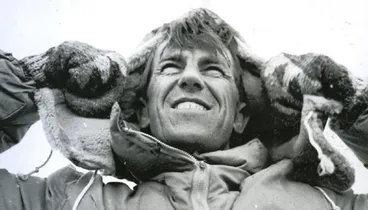
![[Sir Edmund Hillary[?] Nepal - Mt Everest] Image: [Sir Edmund Hillary[?] Nepal - Mt Everest]](https://images.digitalnz.org/D5UnmVq9mkryCUn6kKqHEwyTdVk=/368x0/https%3A%2F%2Fcollection-api.aucklandmuseum.com%2Frecords%2Fimages%2Fmedium%2F518705%2F8b2da63ab5699a65c82bd4d0e266d222f7480416.jpg)
![[Sir Edmund Hillary - Everest Expedition. Copies of ?Times? photos] Image: [Sir Edmund Hillary - Everest Expedition. Copies of ?Times? photos]](https://images.digitalnz.org/DT88PP_H98wyY7TQr2D4xXN_2bw=/368x0/https%3A%2F%2Fcollection-api.aucklandmuseum.com%2Frecords%2Fimages%2Fmedium%2F544093%2F343f346d8b33eed00249a43e661d899188f6fdfd.jpg)
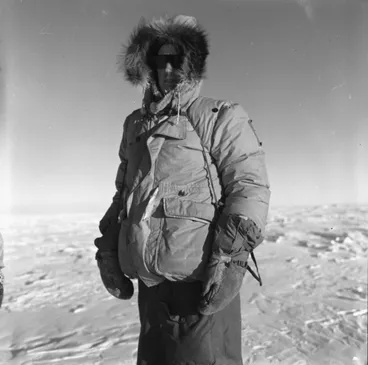
![[Camp 111 at the top of the icefall, Nepal. Sir Edmund Hillary at left, John Hunt, centre, in braces] Image: [Camp 111 at the top of the icefall, Nepal. Sir Edmund Hillary at left, John Hunt, centre, in braces]](https://images.digitalnz.org/fZWJbyGPKKCbbFXXUbmeXklrclk=/368x0/https%3A%2F%2Fcollection-api.aucklandmuseum.com%2Frecords%2Fimages%2Fmedium%2F519106%2Ff60ce0e03acc23bdae7c1ba38cf175c4b9650e78.jpg)
![[Sir Edmund Hillary - Everest Expedition. Copies of ?Times? photos] Image: [Sir Edmund Hillary - Everest Expedition. Copies of ?Times? photos]](https://images.digitalnz.org/Kbm1l1LLk9ekk7xe1eK1gxGJV5w=/368x0/https%3A%2F%2Fcollection-api.aucklandmuseum.com%2Frecords%2Fimages%2Fmedium%2F544105%2F849fb55b161869ca98d8d4c24b000f7e7c6041ba.jpg)
![[Sir Edmund Hillary, Lady June Hillary hiking rest stop, Nepal] Image: [Sir Edmund Hillary, Lady June Hillary hiking rest stop, Nepal]](https://images.digitalnz.org/pSrJBP7Kf9VlivlmXbECHp7x8wI=/368x0/https%3A%2F%2Fcollection-api.aucklandmuseum.com%2Frecords%2Fimages%2Fmedium%2F518920%2F261612095e3c5b14dafc60cd8b49ee45719e5f7a.jpg)
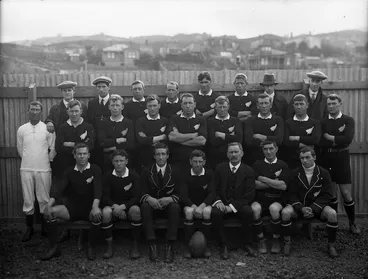
![[rugby match - All Blacks] Image: [rugby match - All Blacks]](https://images.digitalnz.org/B1omOt0Ww9Ik8IdIp3lZS6Om4tw=/368x0/https%3A%2F%2Fmedia.tepapa.govt.nz%2Fcollection%2F82772%2Fpreview)
